Table of Contents
Human kidneys are bean-shaped organs with the primary role of filtering out waste and fluids from the blood and converting them into urine to be excreted from the body. The kidneys also support proper fluid and electrolyte balance in the body, such as sodium, potassium, calcium, and phosphorus, all of which support tissue, blood, muscle, bone, hormonal, and nerve health (1).
So, what can damage your kidneys, and what are foods bad for kidneys that you should be aware of?
Kidney function can become compromised for a multitude of reasons, including high toxicant status, genetics, diet, and lifestyle. Compromised blood flow and mitochondria function can also affect the health and efficiency of our kidneys. Those struggling with metabolic health, such as diabetes and high blood pressure, are at a greater risk of kidney damage, chronic kidney diseases (CKD), or kidney failure.
Let us explore foods rich in minerals such as sodium, potassium, and phosphorus, as well as foods bad for kidneys. Besides, let’s find out what a kidney-friendly diet you can follow to strengthen your kidneys’ health.
Groups of foods bad for your kidneys: Minerals and kidney health
Research suggests an association between Chronic Kidney Disease (CKD) and inadequate intake of some minerals such as phosphorus, potassium, iron, and zinc (2). However, an excess of minerals —notably processed sources —can also compromise kidney function. This is because minerals exist in a very delicate balance in our bodies. Chronic Kidney Disease describes compromised functioning or structural damage of your kidneys for at least three months (3).
The kidneys serve vital regulatory functions in the body. They remove waste and acid while preventing fluid buildup in the body. Overall, our kidneys support the delicate balance of fluids in the blood, such as water, salts, and minerals– including phosphorus, potassium, sodium, iron, zinc, and calcium. Some of these minerals can build up in the blood; therefore, making dietary changes is vital to your kidneys.
Those with CKD should consult a registered dietitian or other qualified health professional to make informed and customized choices for their health (2).
Let’s begin our journey and explore what minerals we should monitor for good kidney health and what foods to avoid if you have kidney disease.
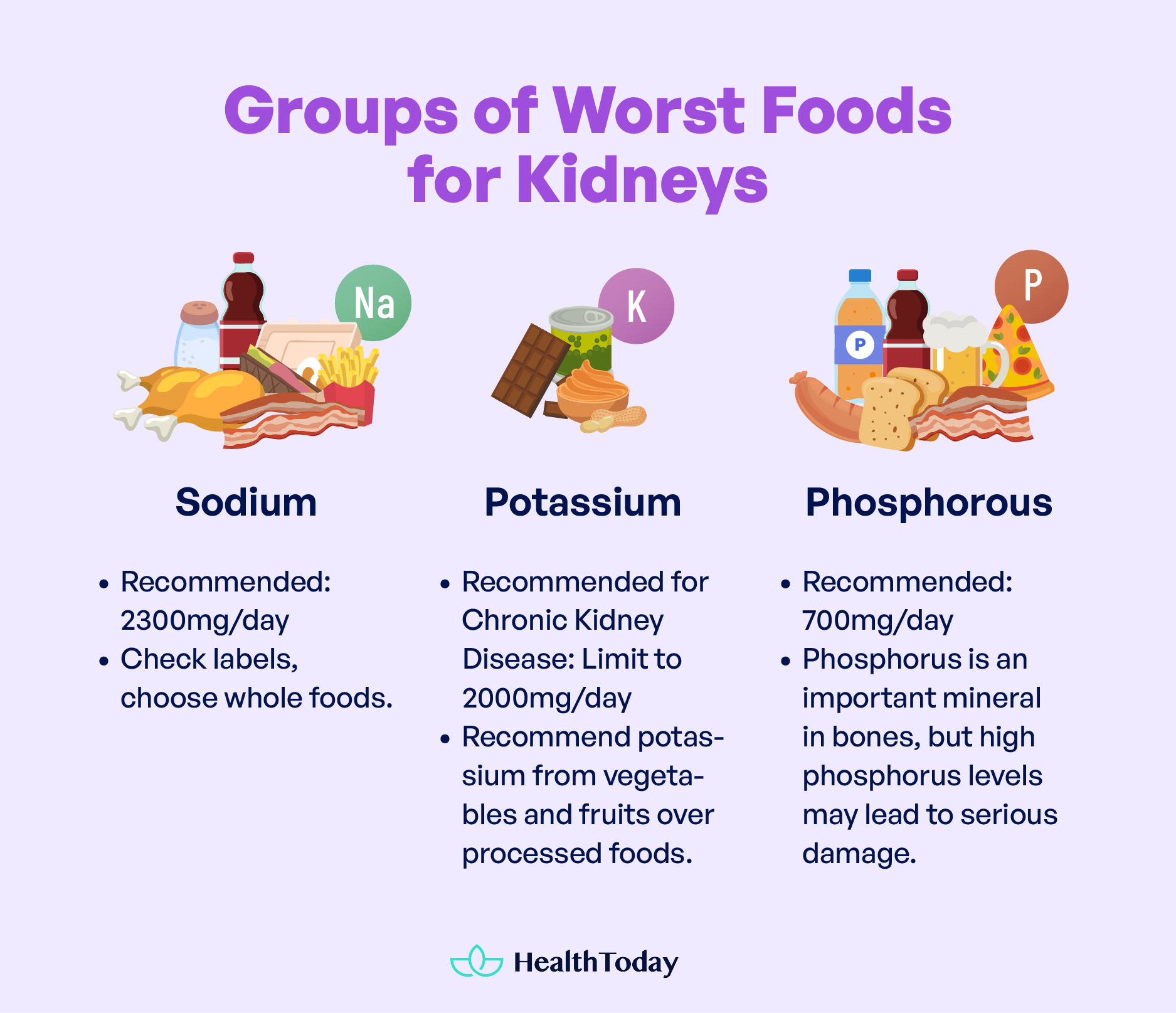
Avoid high sodium
The most common source of sodium is salt, which is a part of every meal. According to the National Kidney Foundation, a healthy diet should contain 2300mg or 2.3g, half a teaspoon of sodium per day (3).
Sodium can be in table salt, salted snacks, cured meat, dairy, sodas/pops, and processed and packed foods. It is wise to check the food labels to eliminate excess salt in your diet.
In such cases, a kidney expert dietitian may recommend a diet based on dietary approaches to stop hypertension (DASH). This diet can help reduce blood pressure and lower the risk of heart disease and kidney stone formation (4). While sodium intake is important for the homeostatic functions of the body, ensuring we obtain it from nutrient-dense whole food sources like leafy greens is a way of modulating consumption.
Avoid high potassium
Potassium is another vital mineral in our foods. A healthy kidney balances potassium levels in the blood; however, an individual with CKD should limit their intake. The National Kidney Foundation in the United States recommends 2,000mg daily for a person suffering from CKD (5). Sources of potassium derived from vegetables and fruits are recommended over processed and packaged foods.
Avoid high phosphorous
Phosphorus is an important mineral in bones, and sufficient amounts of phosphorus are important. High levels of phosphorus may lead to serious damage to the kidneys. The National Kidney Foundation recommends maintaining 700mg per day for normal utilization (6).
To reduce phosphorus intake, you should exclude these foods: bottled beverages with phosphate as an additive, beer & dark colas, candy, and processed foods such as pizza, hot dogs, bacon, and sausages.
Foods to avoid for kidney health
If you’re concerned about your kidney health, it’s better to take the first step by avoiding foods bad for your kidneys and what CKD foods to avoid if you have kidney problems.
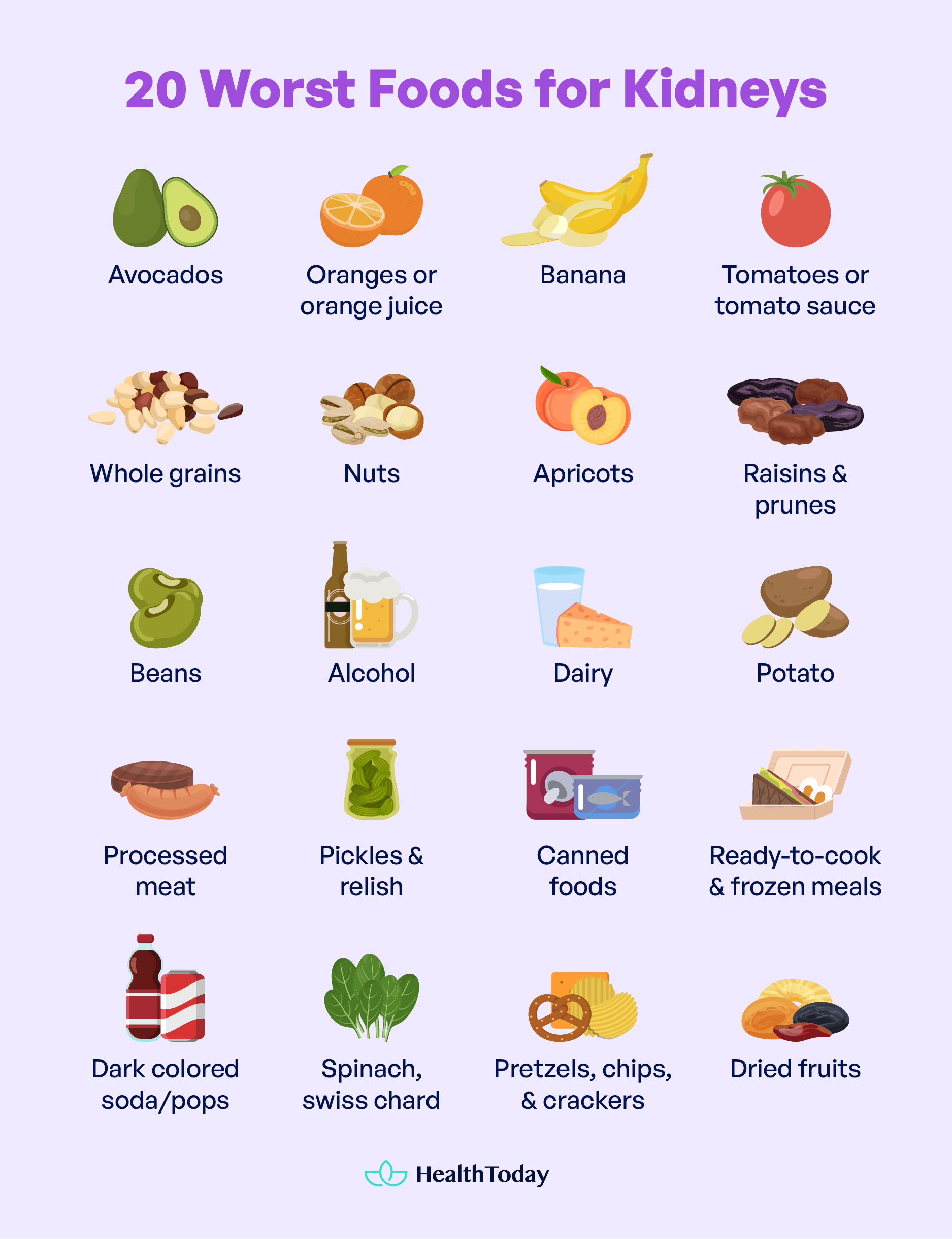
Avocados
Avocados are full of healthy fats and antioxidants. However, they are loaded with potassium, which is something to be mindful of if you are concerned with kidney function. A 100g portion of avocado has 485mg of potassium (7). Avoiding guacamole should be limited when limiting potassium. It also adds up to sodium intake as salt via guacamole preparation.
Oranges or orange juice
Oranges and orange juice are also rich in potassium. According to USDA, one whole orange fruit contains around 255mg of potassium, whereas one cup of chilled orange juice (included from concentrate) contains 443mg of potassium (8, 9).
Banana and kidney disease
Bananas, botanically a berry, aid in weight loss and a healthy heart, provide natural energy, regulate the bowel system, etc. It is a rich source of many nutrients, as well as potassium. According to USDA, one medium-sized raw banana contains 422mg of potassium (10).
Tomatoes and tomato sauce
Tomato and tomato products such as sauce, gravy, and ketchup have high potassium content. Their consumption depends upon the stage of kidney damage. According to USDA, 100g of red, ripe, raw tomatoes, year-round average, contain 237mg of potassium (11). To know your requirements, consult a registered dietitian or qualified health professional.
Whole grains
In general, grains are composed of three layers — the outermost part is bran, a rich source of phosphorus and potassium. If you are suffering from moderate or chronic kidney disease, avoid whole grains (13).
Nuts
Nuts are rich in protein, healthy fats, and oils. However, the amount of potassium and phosphorus in nuts may harm those suffering from kidney disease. For example, one oz of whole almonds contains 136 mg of phosphorus and 208 mg of potassium (14). In contrast, one oz of raw cashew nut contains 168 mg of phosphorus and 187 mg of potassium (15).
Apricots
Generally, apricots, rich in potassium, are avoided in the later stages of kidney disease. According to USDA, one apricot contains 90.6mg of potassium (16).
Raisins and prunes
Dried fruits are a high source of potassium, sugar, and calories. According to USDA, one cup of pitted uncooked prunes contains 1270 mg, which is enough to meet half the requirement of a day (17).
Beans
The plant-based diet is rich in protein, vitamins, minerals, and fiber. Beans or lentils have been found to be a great source of potassium and phosphorus. One cup of boiled or cooked pinto beans contains 251mg of phosphorus and 746mg of potassium (18).
Alcohol
Large amounts of alcohol consumption are strongly associated with kidney malfunction. Due to the toxicity of alcohol, it can impede kidney function and contribute to toxic burdens in the system. It also interacts with medications for diabetes and may increase the risk of low blood sugar. A healthcare professional will plan the amount and frequency of alcohol consumption as per your health conditions.
Dairy
Dairy products such as cheese, milk, and ice creams are good sources of protein and calcium. However, they are also rich in phosphorus and potassium — one cup of 2% milkfat, with added vitamin A and vitamin D, contains 252 mg of phosphorus and 390 mg of potassium (19).
Potato (including French fries, chips, and sweet potato)
Interestingly, potatoes are a rich source of essential amino acids, full of energy and potassium. According to USDA, one baked potato contains about 610 mg of potassium (20). However, potassium level can be reduced by soaking it in water before cooking.
Processed meat
Any meat such as flesh, fat, muscle, or offal can be cured, processed, smoked, or fermented to improve flavor and extend shelf life. Most of these processed meat, such as hot dogs, sausages, beef jerky, corned beef, and pepperoni, are high in sodium.
Pickles and relish
It is a traditional preservation process to create a new flavor, develop probiotic bacteria for a healthy gut, and extend the shelf life of fruits and vegetables. However, they are high in sodium. For example, one large pickle contains 1630mg of sodium, more than half the recommended value for a kidney patient. Therefore, it is important to be mindful of this if you’re concerned relative to kidney function.
Canned foods
Canned foods, such as soups, vegetables, meats, and seafood, are popular because they are convenient and easy to prepare. However, the canning technology requires salt as a preservative to extend the shelf life. Hence, it results in high sodium content in canned food, which cannot be eliminated.
Ready-to-cook or frozen meals
Nowadays, convenient, ready-to-eat food made of any technology, such as extrusion, freezing, etc, is a part of every family. However, most of these products are rich sources of sodium, and one huge serving can cross your recommended daily value.
Dark-colored soda
To increase flavor and shelf life, sodas or pops are made with high phosphorus additives. Along with these minerals, they are also a rich source of calories and sugar. It is reported that added phosphorus gets more absorbed than natural, plant, or animal phosphorus, which is harmful.
Spinach, swiss chard
You might wonder: is spinach good for kidneys? Spinach belongs to the group of green leafy vegetables, which are rich in phytochemicals, vitamins, and minerals, especially potassium. It has been reported that cooking does not affect the potassium content. Physical changes such as significant shrinkage are visible, but potassium content, which varies between 136 and 290 mg per cup, remains unchanged (21).
Pretzels, chips, and crackers
These popular snacks are high in sodium or salt. It’s normal for anyone to exceed their daily allowance value for sodium intake while snacking. Potato chips are especially high in potassium and offer little or no nutritional value.
Dried fruits
The application of dehydration technology reduces the size of fruit but also concentrates nutrients. The concentration is not good for health; therefore, people with kidney disease should not include these in their diets.
Kidney-friendly diet
A kidney-friendly diet needs to be carefully planned by an expert dietitian to provide sufficient nutrition based on one’s needs. The diet depends on the kidney’s working capacity, functioning, and nutrient requirements. Here are tips to help you create a good diet for your kidneys (22):
- Maintain a sufficient protein meal throughout the day. This may include meat, fish, poultry, fresh pork, or eggs.
- Avoid sodium, potassium, and phosphorus-rich processed foods, as mentioned in the above sections.
- Carefully check the food labels. Some products, such as peanut butter, are rich in protein; however, they are also a rich source of potassium and phosphorus.
- To add flavor to the meals, herbs or spices should be added to make food tasty. However, you should limit table salt.
- Limit phosphorus consumption in whole grain and whole wheat bread, bran cereals, and brown rice.
- Potato and asparagus have high amounts of potassium. Broccoli and cabbage can be your safe options for vegetables.
- Be mindful of consuming drinks such as coffee, tea, green tea, water, or other food liquids at room temperature.
Can kidney patients eat sweets?
So, what is the relationship between kidneys and sweets? According to the National Kidney Foundation, increased consumption of sugary foods may worsen kidney function (23). Also, when the kidney does not work properly, phosphorus deposits resulting in the hardening of blood vessels are evident. This can affect the heart and other vital organs as chocolate is rich in phosphorus. Those with kidney problems should restrict their intake.
Is hydration important for kidney health?
Yes, adequate hydration is significant for supporting kidney functioning and ridding the body of toxins.
Are oranges good for the kidneys?
Oranges are rich in potassium. According to USDA, one whole orange fruit contains 232 mg of potassium, whereas 100g of chilled orange juice (included from concentrate) contains 180 mg of potassium (25, 26). While they are nutrient-dense, for those watching their potassium intake, this is something to be mindful of.
Are peaches good for kidneys?
Yes, peaches contain low potassium levels and can be consumed in kidney conditions in consultation with a dietitian (27).
Summary
Now you know the answer to this question: what are foods bad for kidneys?
Those concerned about their kidney function should always keep in mind to avoid food sources rich in excessive amounts of sodium, potassium, and phosphorus. Refraining from processed and refined foods is important because these foods are often packed with excess minerals.
Consuming whole, nutrient-dense foods is important in maintaining adequate amounts of vitamins and minerals, regulating the body’s functions, and ensuring you are not exceeding intake. Metabolic health is also significant in terms of kidney function. Besides, maintaining hydration and reduced toxicant status will help you take better care of your kidneys.
Food sources listed above should be thoughtfully considered based on individual needs and the severity of one’s condition. It is important to understand that for a healthier lifestyle, strict measures are needed for one’s good.
A customized diet plan should be followed with the help of a qualified healthcare professional and maintaining a healthy lifestyle. A renal diet plan may look restrictive sometimes, but you also have diverse and delicious alternatives. Changing mindset is very important.





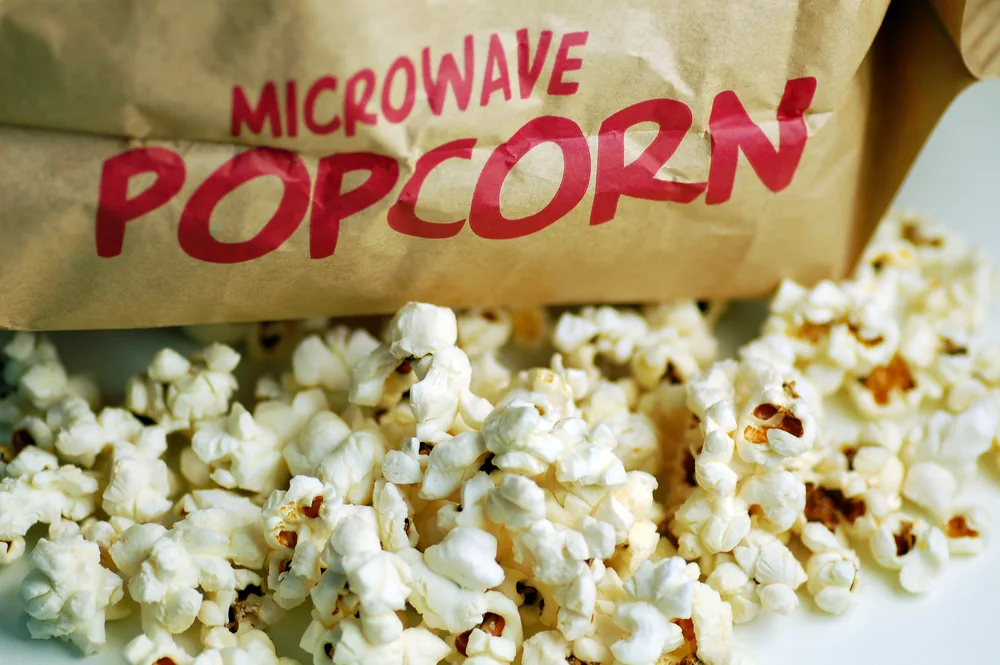
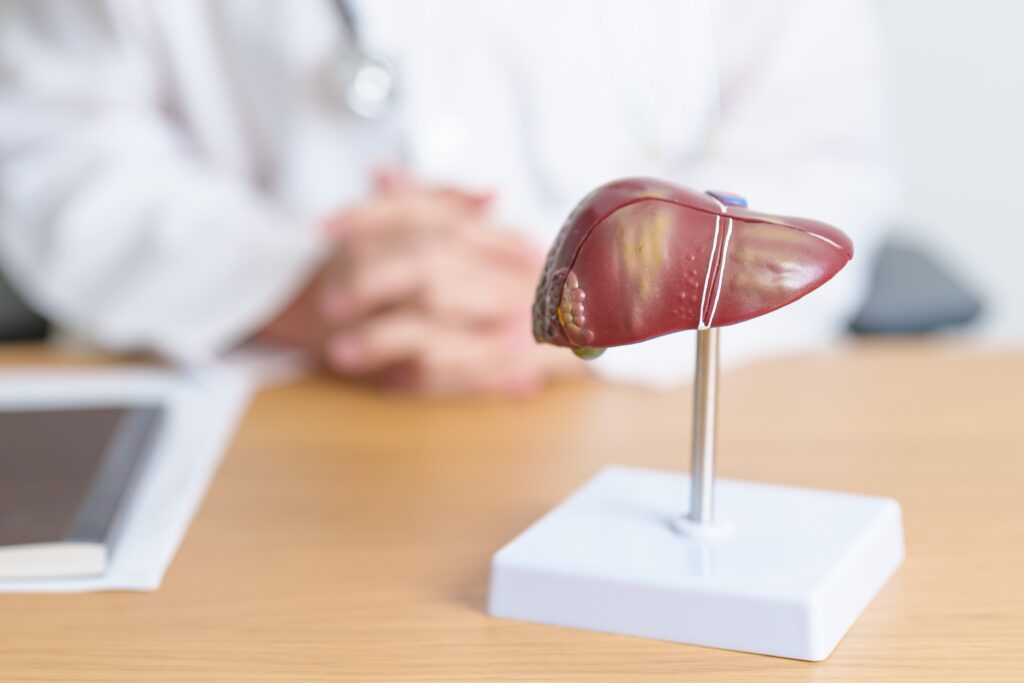




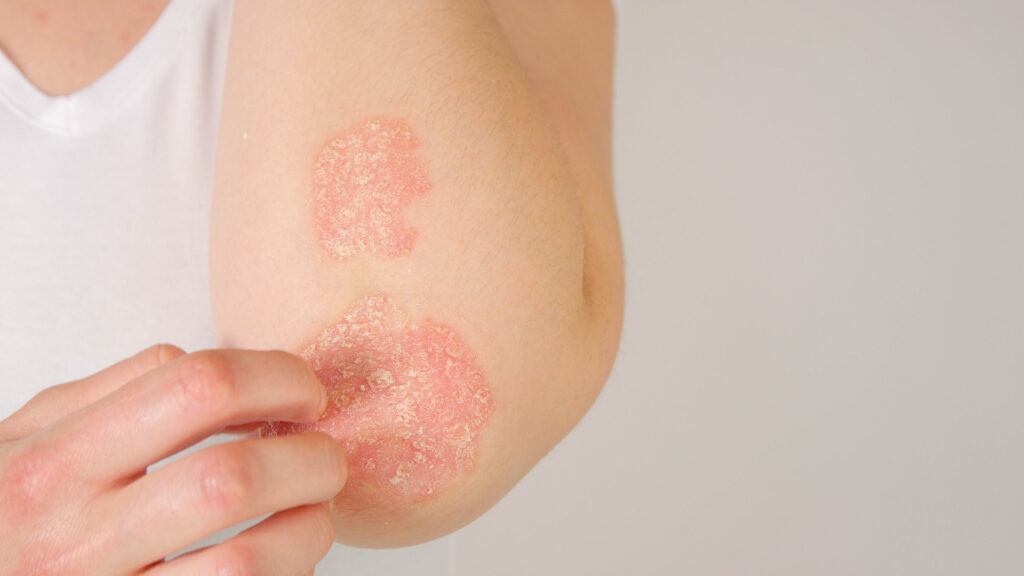

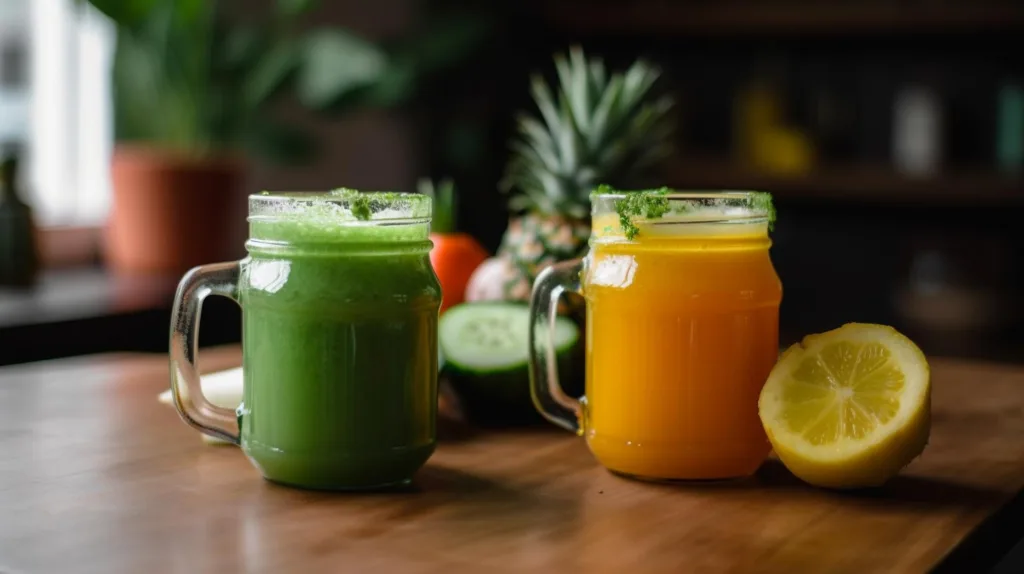
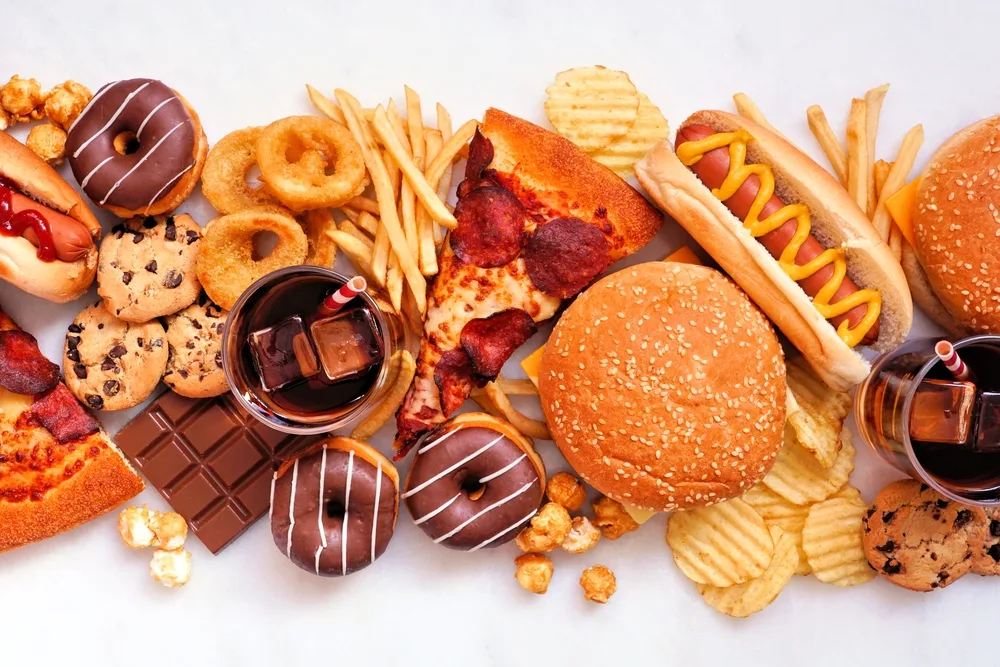
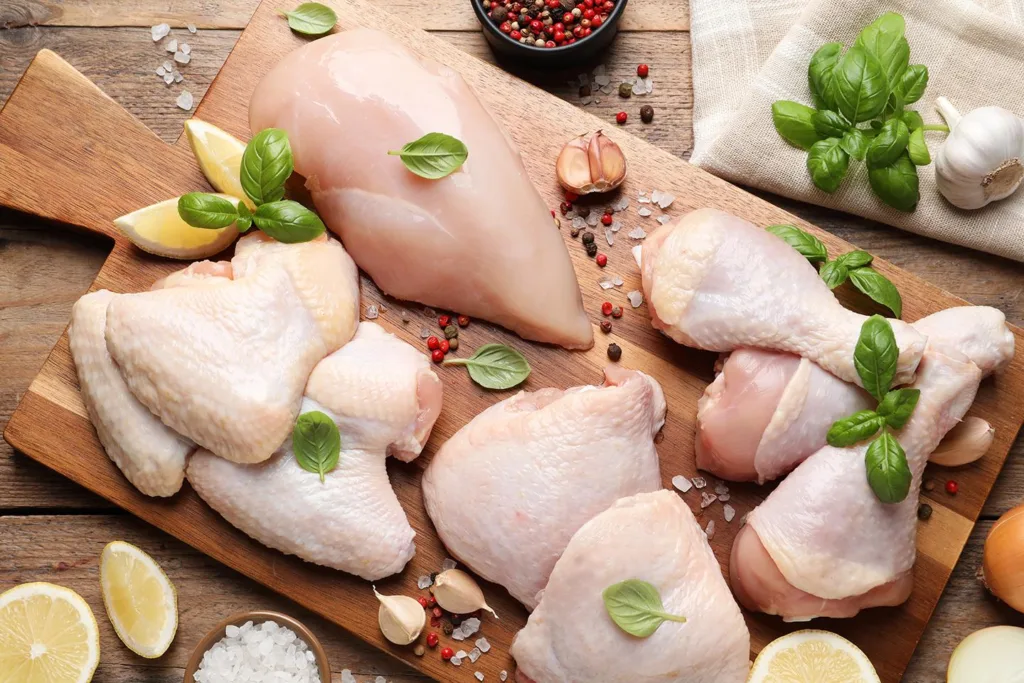
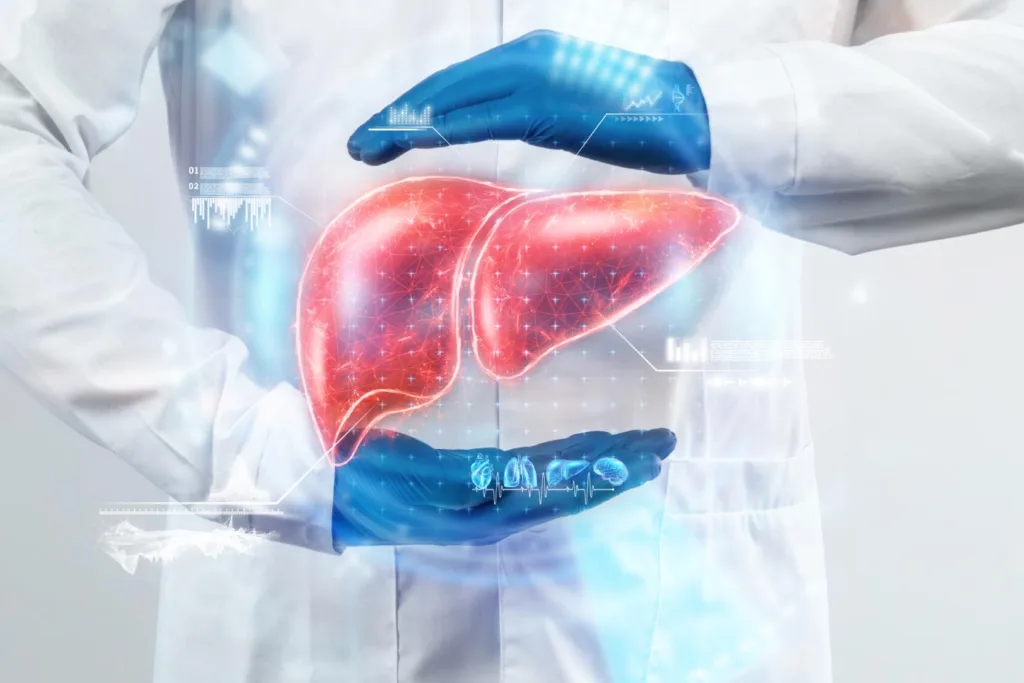
Comments
0